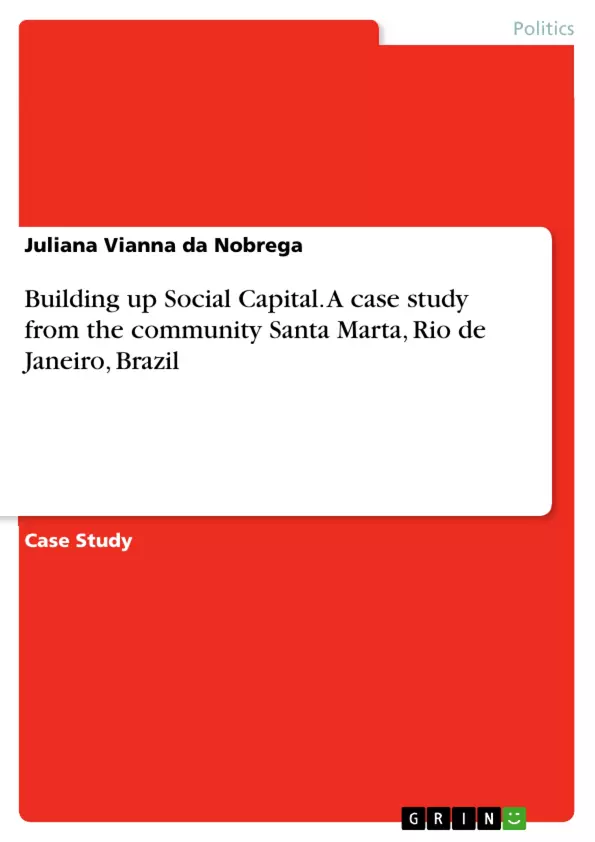The purpose of this paper is to identify and examine the presence of social capital in a slum of Rio de Janeiro city after the implementation of the public security policy that introduced the Police Pacification Units (UPPs) in 2008. Based on fieldwork conducted in the slum Santa Marta, this research presents an analysis of the informal networks of sociability in this community.
It was the first community in the city to receive a UPP, which was created to regain territorial control of the slums. This paper demonstrates how solid social networks in slum areas constitute a form of social capital that encourages public safety and thereby facilitates the social order. The ultimate goal is to provide some recommendations to integrate this unique kind of environment into the formal city.
Inhaltsverzeichnis (Table of Contents)
- Introduction
- Theoretical approaches guiding the case study
- Design of the experiment
- Social structures of slums
- The community Santa Marta
- Public Security in the state Rio de Janeiro from the 1980s to 2014
- The Police Pacification Units and the UPP Santa Marta
- Testing the hypotheses
- Experimental evidence
Zielsetzung und Themenschwerpunkte (Objectives and Key Themes)
This research paper investigates the presence of social capital in the Santa Marta slum in Rio de Janeiro, Brazil, following the introduction of the Police Pacification Unit (UPP) in 2008. The primary goal is to understand how the UPP’s activities have impacted the community’s development of social capital.
- The role of social capital in promoting public safety and social order in slums.
- The impact of community policing initiatives, specifically the UPP, on trust between residents and law enforcement.
- The influence of social networks and informal sociability on building social capital in slum communities.
- The potential for integrating slums into the formal city through partnerships and collaborations.
- The challenges and opportunities of building trust in a context of societal transformation and political instability.
Zusammenfassung der Kapitel (Chapter Summaries)
- Introduction: This chapter sets the stage by highlighting the importance of social cohesion for economic prosperity and sustainable development. It also introduces the context of social change in Brazil, specifically in Rio de Janeiro, where the implementation of the Police Pacification Units aimed to address public safety concerns.
- Theoretical approaches guiding the case study: This chapter explores the theoretical framework for the research, focusing on the concepts of trust, social capital, and community policing. It examines the role of trust in building social capital and how it can be influenced by initiatives like the UPP.
- Design of the experiment: This section outlines the research methodology and the specific objectives of the study. The chapter presents the research questions and the hypotheses that guide the investigation into the presence of social capital in Santa Marta.
- Social structures of slums: This chapter provides an overview of the social structures of slums in general, emphasizing the significance of social networks and informal sociability in these communities.
- The community Santa Marta: This chapter focuses on the specific community of Santa Marta, highlighting its historical context and socio-economic characteristics. It analyzes the community's unique environment and its relationship with the surrounding city.
- Public Security in the state Rio de Janeiro from the 1980s to 2014: This section traces the evolution of public security policy in Rio de Janeiro from the 1980s onwards, examining the challenges faced and the different strategies implemented.
- The Police Pacification Units and the UPP Santa Marta: This chapter delves into the creation and implementation of the Police Pacification Units (UPPs) and specifically the UPP Santa Marta. It explores the aims, methods, and early impacts of this community policing initiative.
Schlüsselwörter (Keywords)
This study focuses on the concept of social capital, its role in promoting public safety and social order within slums, and the influence of the Police Pacification Units (UPPs) in building trust and fostering community development. Other key terms include community policing, informal social networks, slum communities, trust-building, public policy, and sustainable development.
Frequently Asked Questions
What is the impact of Police Pacification Units (UPPs) on social capital in Rio's slums?
The implementation of UPPs aimed to regain territorial control. The study examines whether these units fostered trust between residents and law enforcement, which is essential for building social capital.
How does social capital promote public safety?
Solid social networks within a community act as a form of social capital that encourages social order and facilitates public safety by promoting collective action and mutual trust.
Why was the Santa Marta community chosen for this case study?
Santa Marta was the first community in Rio de Janeiro to receive a UPP in 2008, making it an ideal case to study the long-term effects of this public security policy.
What role do informal networks play in slums?
Informal networks of sociability are the backbone of social structures in slums, providing support and maintaining order where formal state institutions might be absent.
Can slums be integrated into the formal city?
The paper suggests that by leveraging existing social capital and fostering partnerships, it is possible to better integrate these unique environments into the formal urban fabric.
- Arbeit zitieren
- Juliana Vianna da Nobrega (Autor:in), 2013, Building up Social Capital. A case study from the community Santa Marta, Rio de Janeiro, Brazil, München, GRIN Verlag, https://www.grin.com/document/315255



